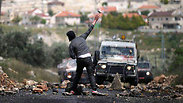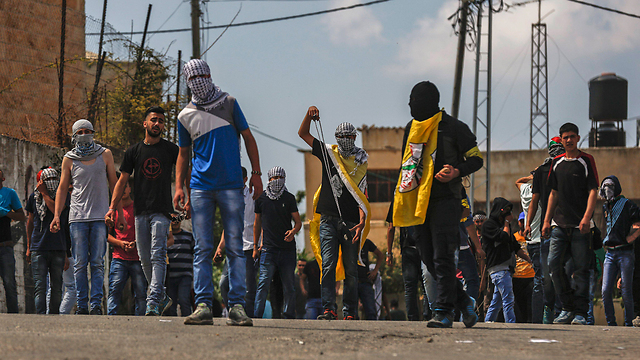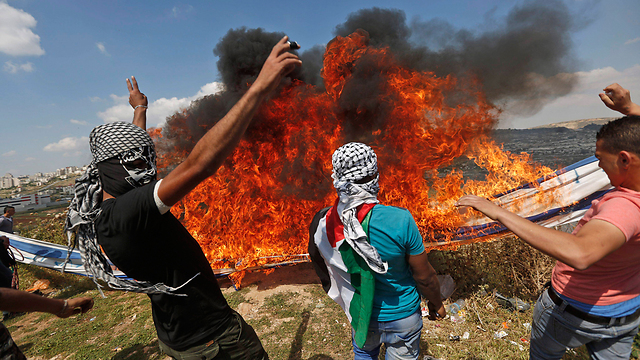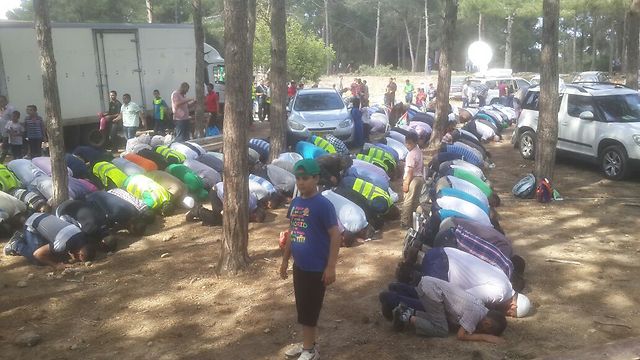
Palestinians mark Nakba Day with protests
Rallies held in the West Bank to demand right of return and commemorate 1948 Arab-Israeli War; 10 hurt in Nablus as Palestinians accuse soldiers of firing live ammunition at crowd protesting Jewish visitors to Tomb of Joseph.
Thousands of Palestinians in Israel and the West Bank demonstrated to mark Nakba Day on Friday.
Clashes erupted between Palestinian demonstrators and Israeli soldiers escorting Jewish worshipers to visit the Tomb of Joseph in Nablus in the West Bank, wounding 10, according to Palestinian sources.
Security officials and Palestinian witnesses said the soldiers had fired live ammunition and rubber bullets at the demonstrators.
The army confirmed the clashes but denied any use of live ammunition.
Friday marked Nakba Day, meaning catastrophe, when many Palestinians fled or were expelled from their towns and villages during the 1948 Independence War that led to the formation of Israel. The anniversary is regularly marred by protests in the West Bank that have often turned violent.
More than 1,000 settlers from nearby settlements were transported by bus early in the day to pray at Joseph's Tomb, and soldiers blocked roads leading to the site, according to Palestinian sources. In protest, Palestinians threw stones, leading to a response from the soldiers.
A spokesman for the army said that it had escorted 3,000 Jewish visitors to the tomb since Wednesday evening. Some 200 Palestinians approached the site, throwing stones and burning tires, she said.
The soldiers responded with "riot control measures" but did not fire live ammunition, she added.
Located in the largest Palestinian refugee camp of Balata, the Tomb of Joseph, son of the patriarch Jacob, is a Jewish place of pilgrimage even though many historians believe that this is the tomb of an imam and the site was once a holy place for the Samaritans, a separate sect of Judaism.
The Israeli army authorized a monthly nocturnal pilgrimage to avoid contact with the local Palestinian population.
Elsewhere, thousands of members of the Islamic Movement in Israel's northern branch participated in a rally in Ofer Forest, near Zikhron Ya'akov in northern Israel, to mark the day. They waved Palestinain and Islamic Movement flags.
"The Palestinian people will soon return to the land from which it was exiled," said participants. "There is no alternative to the formation of an independent state for Palestinians."
Among the participants were Islamic Movement leader Shiek Raed Salah and his deputy, Sheikh Kamal Khatib.
"We will not despair or give up until we receive what we want and reach our destination – the right of return," said protestor Ahmad Mar'i. "We are prepared to sacrifice our lives for the lands that were conquered.
"Unfortunately, the Israeli government continues the occupation policy and that will further intensify under the right-wing composition of the new government, which is going to support building settlements on Palestinian lands."
Many of those present expressed their opposition to demolition of homes. Ashraf Abu Ali, who received a notice of demolition, said that "the Nakba is not over yet. Thousands of Arab homes are facing demolition, based on the claim that they were built illegally. If the state ruins our homes, then it will cause a new Nakba with serious results. We will continue our struggle and will not leave our homes, even if they destroy them on top of us."
A more violent protest occurred near Beitunia, in front of Ofer Prison next to Ramallah, where hundreds gathered. Some threw stones, while others stepped on Israeli flags and set them on fire.
MK Hanin Zoabi said of the day's events that "Israel is continuing the Nakba project – dispossession, expulsion, persecution, and erasing identity. The goal has not changed since '48: maximum control, maximum land, minimum Palestinians, de-legitimizing historical consciousness, and rewriting of history."
According to Zoabi, normalization can occur "only by the Israelis' recognition of the present that continues that history. The Nakba is the history of the Israelis and not only of the Palestinians."
Several hours before the swearing-in ceremony of Israel's new right-wing government on Thursday evening, Palestinian President Mahmoud Abbas reiterated his conditions to returning to peace negotiations: Settlement freeze, prisoners release and committing to negotiate for a year.
Abbas was speaking at an event marking the 67th anniversary of the Nakba.













